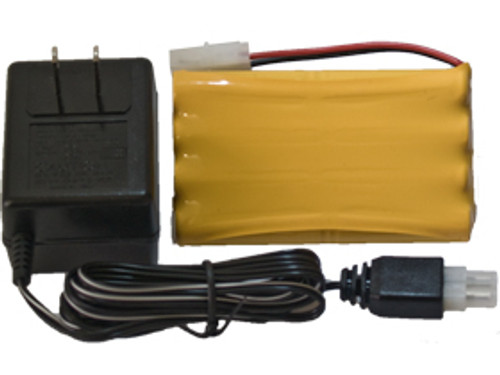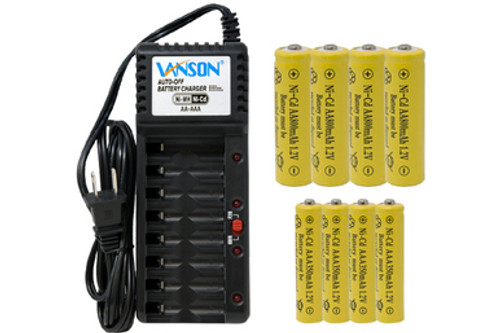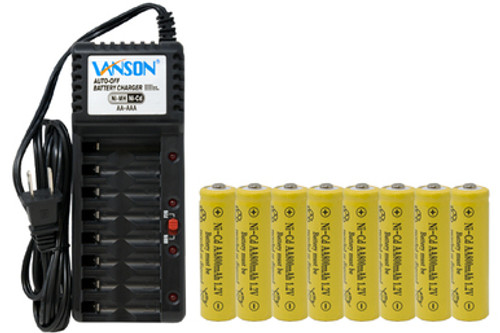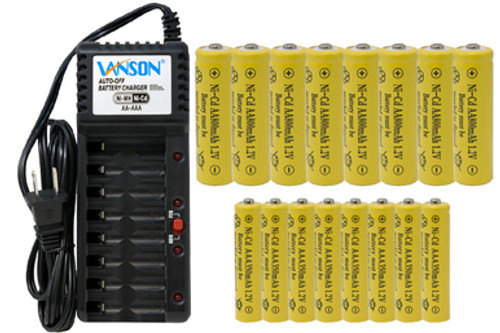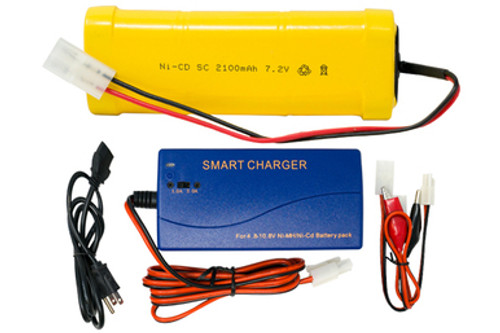
Nickel Cadmium (NiCd) batteries have been a cornerstone in the world of rechargeable batteries for decades. Known for their durability, ability to withstand extreme conditions, and reliable power delivery, NiCd batteries remain a popular choice for various applications such as power tools, toys, and emergency lighting.
Advantages of NiCd Batteries
1. Durability and Longevity
Rechargeable Lifespan: NiCd batteries can be recharged hundreds of times before needing replacement, making them a cost-effective alternative to disposable batteries.
Heavy-Use Resilience: These batteries deliver consistent power under high loads, making them ideal for power tools and other high-drain devices.
2. Temperature Tolerance
Extreme Conditions: NiCd batteries excel in operating temperatures ranging from -20°C to 60°C, ensuring consistent performance in both hot and cold environments.
Outdoor Applications: Their ability to handle harsh conditions makes them a preferred choice for outdoor and industrial uses.
3. Versatile Compatibility
Multiple Sizes and Shapes: NiCd batteries come in standard sizes like AA, AAA, C, and 9 Volt, as well as custom battery packs, making them suitable for a variety of devices.
Broad Application Range: From powering flashlights and remote controls to providing backup energy for emergency lighting, NiCd batteries are versatile across various applications.
Advantages of NiCd Battery Chargers
NiCd battery chargers are designed to complement the unique features of NiCd batteries, offering several benefits:
1. Cost Savings
Reusable Batteries: By recharging NiCd batteries, users can save money over time compared to continually purchasing disposable ones.
2. Environmental Friendliness
Reduced Waste: Reusing NiCd batteries decreases the number of disposable batteries that end up in landfills, reducing environmental impact.
3. Convenience
Easy Operation: Most chargers require you to simply insert the batteries and plug the charger into a power source, such as a wall outlet or USB port.
Advanced Features: Many NiCd chargers include features like:
Automatic Shutoff: Prevents overcharging to extend battery life.
Overcharge Protection: Ensures safety and prevents battery damage.
4. Versatility
Multi-Size Charging: Some chargers are compatible with multiple battery sizes and types, offering flexibility and value.
Drawbacks of NiCd Batteries
Despite their many advantages, NiCd batteries have a few limitations:
1. Memory Effect
Performance Degradation: If not fully discharged before recharging, NiCd batteries may "remember" the smaller capacity, leading to reduced overall performance.
Maintenance Requirement: To avoid memory effect, users should periodically fully discharge and recharge their batteries.
2. Lower Energy Density
Limited Capacity: Compared to newer battery technologies like Lithium Ion (Li-Ion), NiCd batteries have a lower energy density, meaning they store less energy for their size.
Weight Considerations: For applications requiring compact and lightweight power sources, NiCd batteries may not be the most efficient choice.
NiCd Battery Compatibility
NiCd batteries are widely compatible with a range of devices and configurations:
Standard Sizes: Available in AA, AAA, C, and 9 Volt sizes for everyday devices like remote controls, flashlights, and toys.
Custom Packs: Designed for specific industrial or professional applications, such as power tools and emergency lighting systems.
Chargers: Compatible chargers are essential for maintaining performance and ensuring safety. Many NiCd chargers can handle multiple sizes or types of batteries, adding convenience for users with diverse energy needs.
Comparing NiCd to Modern Battery Technologies
While NiCd batteries offer durability and reliability, they face competition from newer technologies like Lithium Ion (Li-Ion) and Nickel-Metal Hydride (NiMH). Here’s how NiCd batteries compare:
1. NiCd vs. Li-Ion
Energy Density: Li-Ion batteries store more energy for their size and weight, making them a better choice for compact devices like smartphones.
Durability: NiCd batteries are more robust under extreme conditions and heavy use.
Cost: NiCd batteries are typically more affordable upfront than Li-Ion batteries.
2. NiCd vs. NiMH
Memory Effect: NiMH batteries are less susceptible to memory effect, requiring less maintenance.
Energy Capacity: NiMH batteries often have a higher capacity than NiCd, providing longer runtime per charge.
Durability: NiCd batteries remain the better choice for high-drain devices and extreme environments.
Best Practices for Using and Maintaining NiCd Batteries
To get the most out of your NiCd batteries and chargers, follow these tips:
1. Avoid Memory Effect
Fully discharge your batteries occasionally before recharging to prevent capacity loss.
2. Use Compatible Chargers
Ensure your charger is designed for NiCd batteries and supports the correct sizes and chemistries for optimal performance.
3. Store Batteries Properly
When not in use, store NiCd batteries in a cool, dry place to prevent capacity degradation.
4. Clean Contacts
Regularly clean the battery terminals and charger contacts with a dry cloth to maintain efficient charging.
5. Monitor Charging Cycles
Use chargers with features like automatic shutoff and overcharge protection to extend battery life and ensure safety.
Is NiCd Right for You?
NiCd batteries and chargers are ideal for users who prioritize durability, reliability, and performance in demanding conditions. They’re particularly well-suited for:
Power Tools: Deliver consistent energy under heavy loads.
Outdoor Applications: Withstand extreme temperatures for reliable performance.
Emergency Lighting: Provide dependable backup power in critical situations.
Nickel Cadmium batteries and chargers remain a trusted choice for many applications, offering durability, versatility, and reliable performance under demanding conditions. While newer technologies like Lithium Ion and NiMH have gained popularity, NiCd batteries still hold their ground in high-drain, extreme-temperature, and industrial applications.
By understanding the strengths and limitations of NiCd batteries and using compatible chargers, you can make an informed decision about whether this technology is the right fit for your needs. Whether powering tools, toys, or emergency systems, NiCd batteries continue to deliver reliable energy solutions for users worldwide.





